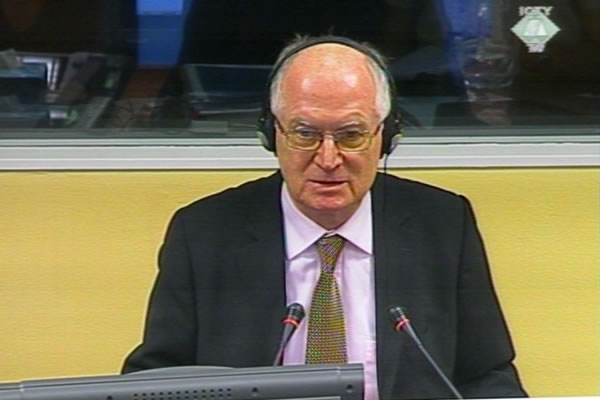Home
DID HADZIC BETRAY KRAJINA SERBS?
The defense is arguing that Goran Hadzic was a ‘dove’ in the Republic of Serbian Krajina and was constantly under pressure from the hard-line ‘hawks’, who might have considered him a traitor. How the implementation of the Vance Plan prevented the Krajina police from putting a stop to human right abuses
 Geert Ahrens, witness at the Goran Hadzic trial
Geert Ahrens, witness at the Goran Hadzic trial In the cross-examination of German diplomat Geert Ahrens, Goran Hadzic’s defense put it to him that the Krajina Serbs were unable to prevent the crimes in Croatia because they were implementing the Vance Plan. According to the plan, the area had to be demilitarized, and the regular police had only side arms and was thus powerless to put a stop to human rights abuses. The German diplomat was in the region from 1991 to 1996, trying to implement various peace initiatives. Minority and human rights were in his remit.
As Ahrens recounted, he talked to Hadzic several times about the human rights abuses in Krajina. Hadzic admitted that there were crimes, but brushed them off, saying such occurrences were ‘understandable’ in a war.
Unlike other Serb officials, Hadzic was ‘more approachable’, as Ahrens said, and he asked for support in the development of a human rights protection system. At a meeting in Plitvice in August 1993, Hadzic said he ‘personally’ could not rule out the possibility that Krajina might end up remaining in Croatia, but ‘to say that publicly would endanger’ him. The defense counsel also put it to Ahrens that Hadzic was under constant pressure from the ‘hard liners’ who might have considered him a traitor because he was ready to accept the agreements that had been rejected by ‘his’ assembly.
Since in his examination-in-chief Ahrens claimed that Hadzic ‘played the key role in the negotiations’, the defense counsel quoted an earlier statement Ahrens had made, which appears to be contradicting this claim. Ahrens had said that during the Croatian military operation “Maslenica” in January 1993, Hadzic headed the negotiating team but had no military knowledge and hailed from UN Protected Area East, which was hundreds of miles away from the Maslenica bridge. The defense counsel suggested that Babic and Martic played a much more important role. Babic had preceded Hadzic as the RSK President, while Martic succeeded him. Ahrens remained adamant that Hadzic had the ‘final say’.
The German diplomat also said that Hadzic did trust him to an extent, and that the Serbs generally thought that Ahrens was not ‘a Serb hater’. He confirmed that Hadzic never told him that non-Serbs should be segregated from Serbs or evicted, adding that in the end, the non-Serbs were forced to leave.
Goran Hadzic’s trial continues tomorrow with a new prosecution witness.Linked Reports
- Case : Hadzic
- 2013-08-21 MARTIC’S POLICE ‘WORKED’ FOR HADZIC
- 2013-08-20 WHAT HADZIC ‘WANTED AND COULD DO’
- 2013-07-17 AN EYE FOR AN EYE, A TOOTH FOR A TOOTH
- 2013-09-02 POWERS OF ‘A SELF-PROCLAIMED PRESIDENT OF A SELF-PROCLAIMED REGION’
- 2013-09-04 WHO WAS IN CHARGE OF ARKAN
- 2013-09-12 ‘STRONGER THAN STEEL’
